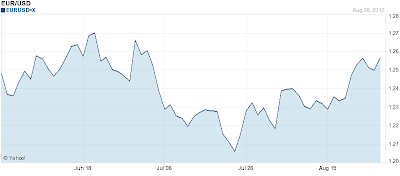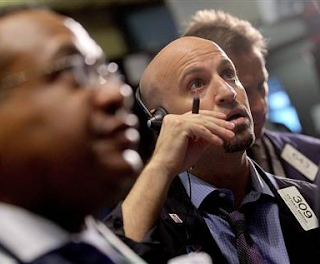A Mess of Mario Draghi's Own Making
Our founder earned clients a 23% average annual return over five years as a stock analyst on Wall Street. "The Greek" has written for institutional newsletters, Businessweek, Real Money, Seeking Alpha and others, while also appearing across TV and radio. While writing for Wall Street Greek, Mr. Kaminis presciently warned of the financial crisis.
Mario Draghi's Mess
“The ECB chief has been under the spotlight since declaring that the euro would not fail and the ECB would not fail it.”
Federal Reserve
Considering Draghi was scheduled to partake in a panel discussion on Saturday, it would appear that he would likewise not offer much new news. Draghi, like Bernanke, also has a prescribed process to follow and all sorts of other red tape to work through before issuing policy, and especially before launching any new initiative. This makes it highly unlikely that he could do anything more than disappoint the high expectations of the market this weekend. But, he only has himself to blame for the predicament he finds himself in today.
Shaky markets were reassured by his July 26th statement to a London investment conference marking the start of the Olympics. Draghi’s now infamous declaration read, "Within our mandate, the ECB is ready to do whatever it takes to preserve the euro. And believe me, it will be enough." Markets mostly focused on the “it will be enough” part, and unfortunately tossed the “within our mandate” portion aside for later chewing. Continuing on an upward trajectory begun in early June, the SPDR S&P 500 (NYSE: SPY) climbed another 3.8% from July 26 through August 28. The SPDR Dow Jones Industrials Average (NYSE: DIA) gained 2.0% and the PowerShares QQQ (Nasdaq: QQQ) has risen 7.9%. Obviously, Draghi has had more influence on the direction of the euro and European shares. You can see the stabilizing impact of Draghi’s statement clearly in the chart of the euro/dollar comparison.

Chart by Yahoo Finance
Draghi’s impact is also prominently behind the more significant gains of European stocks, in comparison to U.S. shares since July 26. The iShares S&P Europe 350 (NYSE: IEV) has gained 7.0% through August 28. ETFs of the hardest hit nations of Europe have done even better; those are the nations that would benefit from ECB purchases of their debt.
ETF SECURITY
|
CHANGE JULY 26 –
AUG. 28
|
iShares MSCI Spain Index (NYSE: EWP)
|
+19.6%
|
iShares MSCI Italy Index (NYSE: EWI)
|
+15.4%
|
Global X FTSE Greece 20 (NYSE: GREK)
|
+11.5%
|
iShares MSCI France Index (NYSE: EWQ)
|
+8.9%
|
iShares MSCI Germany Index (NYSE: EWG)
|
+8.6%
|
But since Draghi’s statement, he’s found himself backtracking and qualifying comments. His announcement about missing Jackson Hole to focus on an otherwise busy work schedule was clearly carefully constructed to manage expectations. Spanish yields have expanded since the news broke that he would not appear at the central bank event. However, his reason for not making it, because of workload, implies he’s possibly working on something that might support the euro and the region generally. It’s quite a mess he’s found himself in, and one our own Fed chief does his best to avoid. It is not central bank concern to manage equity market expectations, but stock investors follow closely the words of those who impact the cost of corporate funding. So, wise bankers carefully word every statement so as to keep speculators from reading into anything.
Draghi’s infamous words did exactly the opposite. I suppose the leaders of Europe are happy about that today, since the euro has stabilized, yields have eased, and European equity portfolios have fattened. However, the devils in the game at play will eventually take the candy away and replace it with nails. It’s a game best not entered, and one I’m sure Mario Draghi wishes he did not step into. If this is not yet so, I’m certain that someday he will regret it.
Please see our disclosures at the Wall Street Greek website and author bio pages found there. This article and website in no way offers or represents financial or investment advice. Information is provided for entertainment purposes only.
Labels: Editors_Picks, Editors-Picks-2012-08, Europe, Europe-2012-Q3, Federal_Reserve, Federal-Reserve-2012-Q3, Market-Outlook, Market-Outlook-2012-Q3

























